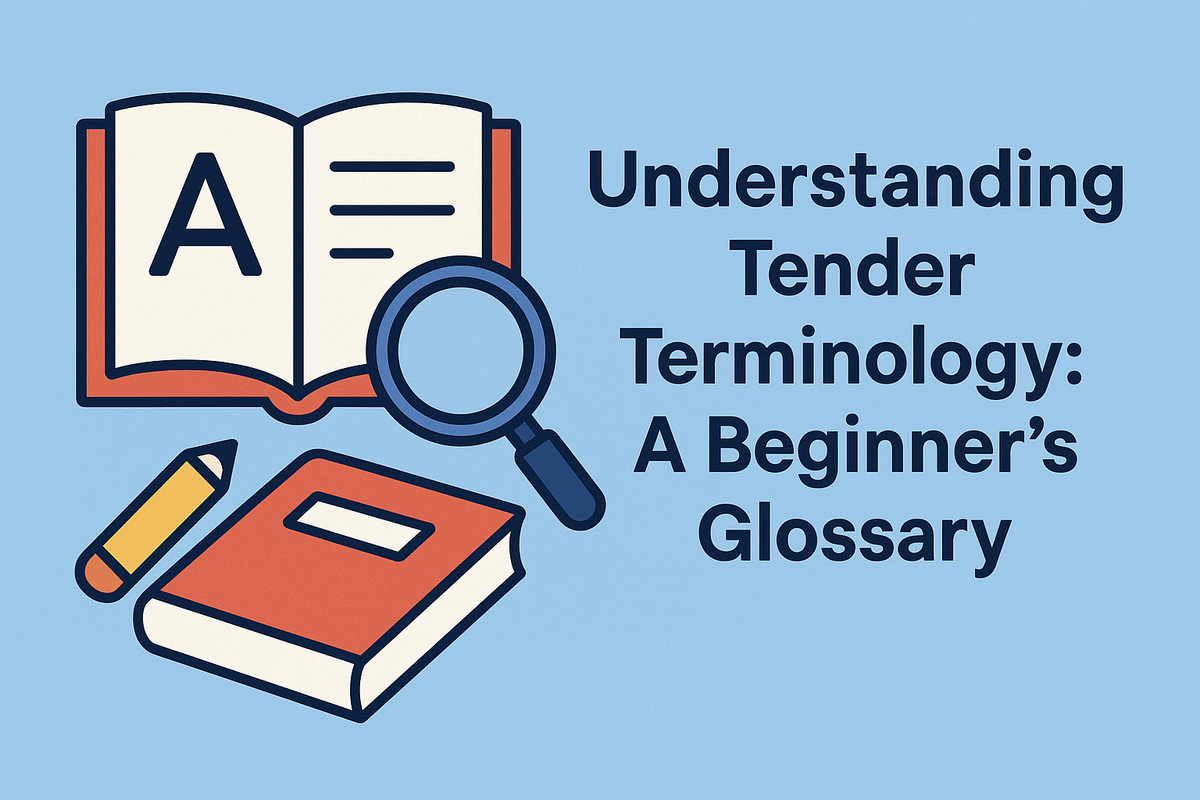Understanding Tender Terminology: A Beginner’s Glossary
14 Aug 2025 · By FetchTenders

If you’re new to bidding, the jargon in tender documents can feel like a foreign language. This beginner-friendly glossary explains the most common terms you’ll see in South African tenders, so you can read with confidence and submit stronger bids.
New to tenders? Create a free Fetch Tenders account to receive relevant opportunities in your inbox and save your favourite searches.
Core procurement documents
- RFI (Request for Information): A market scan to gather info. Not a bid—no award is made. Helps buyers shape a later RFQ or RFP.
- RFQ (Request for Quotation): A quick, price-focused request for standard goods/services. Usually lower values and short lead times.
- RFP (Request for Proposal): A detailed request that evaluates technical approach, experience, methodology and price.
- Tender / Bid: Your formal offer responding to an RFQ/RFP/ITB.
- ITB/Invitation to Bid: Formal notice inviting suppliers to submit bids (also “Invitation to Tender”).
South African compliance & registrations
- CSD (Central Supplier Database): National Treasury’s supplier registry. Many organs of state require an active CSD registration to be eligible.
- BBBEE (Broad-Based Black Economic Empowerment): A scorecard system that can affect preference points and subcontracting obligations.
- PPPFA (Preferential Procurement Policy Framework Act): The law governing preference/points in public procurement; implemented via current regulations in the bid docs.
- CIDB: Construction Industry Development Board grades/registrations used on construction works tenders.
- Tax Compliance Status (TCS): Proof from SARS that your tax affairs are compliant (often verified electronically).
Bid packaging & mandatory forms
- SBD / MBD forms: Standard/Municipal Bidding Documents that must be completed and signed (e.g., SBD1, SBD4, SBD6.1, SBD8, SBD9). Missing or incorrectly completed forms can make a bid non-responsive.
- BOQ (Bill of Quantities): Itemised list to price each work element in construction/engineering bids.
- Technical Proposal: Your methodology, approach, team and relevant experience.
- Financial/Price Proposal: Your pricing schedule or detailed quote (often in the prescribed template).
- Supporting Documents: Certificates, company docs, references, track record, resumes, financials and any required accreditations.
Process & evaluation terms
- Briefing Session / Site Meeting: A meeting (sometimes compulsory) to clarify the scope; attendance registers are used.
- Closing Date/Time: The strict deadline for submission. Late bids are usually rejected unopened.
- Validity Period: How long your offer must remain open for acceptance—often 60–120 days.
- Addendum: An official change/clarification issued during the tender period. Must be acknowledged in your bid.
- Clarification: Buyer questions to explain parts of your bid (not a chance to materially change price or scope).
- Mandatory Requirements: Pass/fail criteria (e.g., certifications, attendance, forms). Missing these = automatic disqualification.
- Functionality / Technical Threshold: A minimum score your technical proposal must achieve to be considered further.
- Responsive Bid: A bid that meets all mandatory and submission requirements.
- Preference Points: Points awarded based on price and preference criteria (e.g., BBBEE) as set out in the regulations/bid docs.
- Award / Letter of Award: Formal notification that you’ve won. Often followed by contract finalisation.
Commercial & contract terms
- Performance Guarantee / Bid Security: Financial security (if required) to ensure performance or bid seriousness.
- Service Level Agreement (SLA): Contract terms covering scope, KPIs, response times, penalties, etc.
- Delivery Lead Time: Time from order to delivery/commencement.
- Payment Terms: How and when you’ll be paid (e.g., 30 days from invoice).
- Subcontracting: Portion of work performed by another party; may be mandatory for certain categories.
- Deviation / Variation: Approved change to scope/specs after contract award.
How to use this glossary when you bid
- Skim the whole document first. Circle unfamiliar words and look them up here.
- Check mandatory items early. Confirm CSD, TCS, BBBEE and required SBD/MBD forms.
- Build a submission checklist. Include forms, technical docs, price schedules and signatures.
- Note the validity period and closing time. Work backwards to plan internal reviews.
- Track addenda. If one is issued, acknowledge it and adjust your proposal if needed.
Final tips
- Always use the buyer’s exact templates (forms, price schedules, BOQ).
- Sign everywhere a signature is requested (including witnesses if required).
- If a briefing is compulsory, attend and sign the register.
- Ask clarifying questions before the cutoff date listed in the tender.
- Keep copies of everything you submit.
Need help finding the right opportunities? Set up your free alerts in minutes: Start here.
